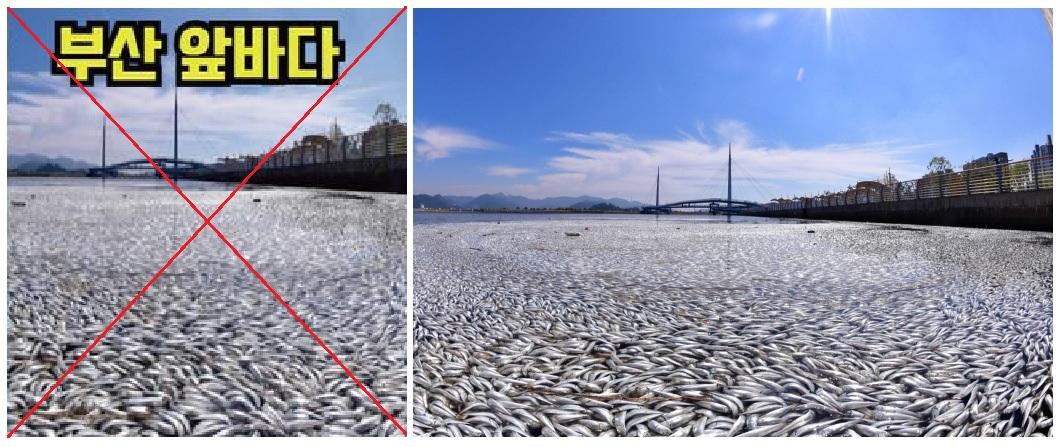
Old photo of dead fish in harbour falsely linked to Fukushima wastewater release
- This article is more than two years old.
- Published on September 6, 2023 at 07:39
- 3 min read
- By SHIM Kyu-Seok, AFP South Korea
"Hours after the wastewater was released, scores of dead fish were found in the waters of Busan," reads the Korean-language claim shared here on August 25, 2023.
"The wastewater was deemed safe, but a serious situation emerged on the first day of its release."
The post includes two images, with one showing a coastal factory compound labelled "site of the Fukushima wastewater release" and another that appears to show a harbour filled with dead fish labelled "the sea in front of Busan".
It also links to a tabloid news report that reads in part: "As wastewater from Fukushima was released from 13:00 on the 24th, surprising reports emerged about a phenomenon of mass fish deaths observed in the sea in front of Busan."

The claim circulated a day after Japan began the gradual discharge of treated wastewater from the Fukushima nuclear plant on August 24 as part of a process deemed safe by the country's marine authorities as well as the UN atomic watchdog IAEA.
But the move triggered a heavy backlash from South Korea and China, inflamed by misinformation circulating on social media.
The same photos along with the false claim were also shared on Facebook here, here and here.
The first image corresponds to a file photo by The Associated Press and shows the Fukushima nuclear plant (archived link).
But the photo of the harbour filled with dead fish is from October 2022 in a different coastal city in South Korea.
Dead fish photo
A Google reverse image search found the picture showing a harbour filled with dead fish corresponds to a photo published in Busan Ilbo on October 2, 2022 (archived link).
The Korean-language caption states the photo shows thousands of dead fish believed to be anchovies or herring in a bay near the southern city of Changwon, about 42 kilometres (26 miles) from Busan (archived link).
"Changwon city collected the fish remains and commissioned a specialist organisation to investigate the cause of the mass death. Photo provided by Gyeongnam Domin Ilbo," the caption reads.
Below is a screenshot comparison of the dead fish photo shared in the false posts (left) and Busan Ilbo photo (right):

The same photo was also published with a similar caption by the South Korean newspaper Kyunghyang Shinmun on October 2, 2022, also attributed to Gyeongnam Domin Ilbo, a local news organisation based in South Gyeongsang Province (archived links here and here).
Gyeongnam Domin Ilbo published a report on October 13, 2022, alongside multiple other photos from the same site in Changwon, which said dead fish were found in the area for over a week after they were first discovered on October 1 (archived link).
The news organisation also published footage of the mass anchovy death on its YouTube channel on October 2, 2022 (archived link).
Seo Young-il, a researcher at South Korea's official fisheries research body the National Institute of Fisheries Science, told AFP the photo was from one of several mass fish death incidents reported in 2022 around the southern coastal cities of Changwon and Tongyeong (archived link).
Seo said on September 4 most of the fish were killed because of the "result of low oxygen levels in the water" caused by factors like changing water flows.
He added that marine researchers in South Korea have not seen any cases attributed to radiation wastewater anywhere in the world.
"There have been no reported cases of anchovies or any other kind of fish dying en masse anywhere in the country after the wastewater release began," Seo said.
A spokesperson for South Korea's Ministry of Oceans and Fisheries also told AFP the claim was "fake news", adding that the ministry was actively combatting misinformation about the Fukushima wastewater release (archived link).
AFP did not find any reports about mass fish deaths in Busan or elsewhere in South Korea published after Japan's wastewater release.
AFP has also previously debunked similar false claims about a video of dead fish washed up on Japan's western coast here, and other false claims about the Fukushima wastewater release here and here.
Copyright © AFP 2017-2026. Any commercial use of this content requires a subscription. Click here to find out more.
Is there content that you would like AFP to fact-check? Get in touch.
Contact us
